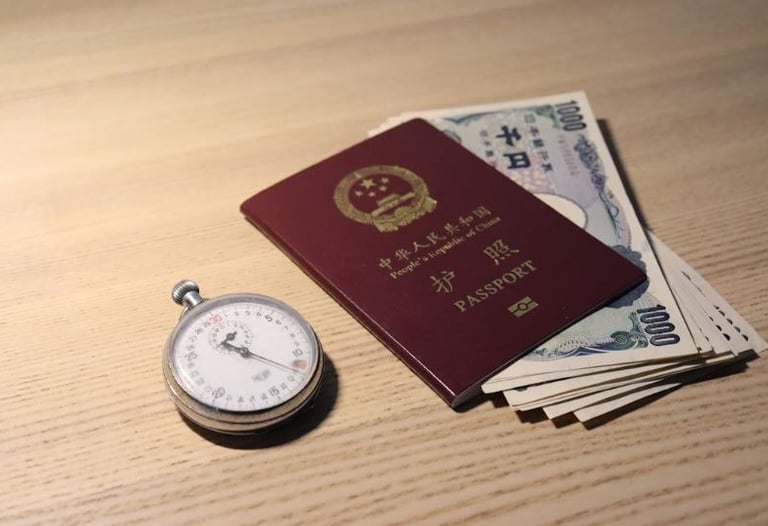New Immigrants: Start Building Credit Immediately or Face Financial Isolation!
IMMIGRANT CREDITCREDIT BUILDINGFINANCIAL EDUCATIONPERSONAL CREDITCREDIT ASSISTANCE
CBI Contributor
10/19/20256 min read


Understanding Credit in the U.S.
Credit Score Basics
In the U.S., a credit score shows how trustworthy you are when borrowing money. It ranges from 300 to 850, with higher scores meaning better credit. Your score is based on your credit history, which includes your payment history, the amount of credit you use, the length of your credit history, the types of credit you have, and recent credit inquiries.
Importance of Credit
Having a good credit score is important. It affects almost every part of your financial life. A high credit score helps you get loans with better terms, find better housing, and can even impact job chances because some employers check credit scores when hiring. On the other hand, a low or missing credit score can limit your options, leading to higher interest rates or outright denials of credit applications.
Challenges New Immigrants Face with Credit
Lack of Credit History
One major challenge new immigrants face when settling in a new country is the lack of a credit history. This lack of credit history makes it difficult for lenders to determine whether they can trust an individual to repay a loan. Immigrants often struggle to obtain loans or credit cards without proof of responsible borrowing and repayment history. This can create difficulties when purchasing essential items, such as cars or homes, or paying for education or other key investments.
As a result, newcomers may fall into a cycle of financial exclusion and struggle to establish a credit profile. They may rely more on cash transactions or high-cost financial services, which typically have higher fees and less favorable terms.
Misconceptions and Lack of Information
Many immigrants come from countries with different credit systems, leading to misunderstandings about how personal credit works in the U.S. For example, some people think that avoiding credit is a good idea. They don’t realize that having no credit can be as harmful as having bad credit.
Discrimination and Bias
Immigrants often face biases and challenges in the financial system, making it difficult for them to access critical financial services. These biases can manifest in various ways, such as unfair lending practices or banks failing to understand the unique circumstances of immigrants. Because of this, immigrants must build and keep a strong credit history.
A good credit profile helps demonstrate a borrower's creditworthiness and reliability to lenders and financial institutions. By establishing a solid credit history, immigrants can enhance their chances of securing loans, credit cards, and more favorable interest rates, which enables them to manage their finances more effectively.
Immediate Steps to Start Building Credit
Obtain a Social Security Number (SSN) or Individual Taxpayer Identification Number (ITIN)
To build credit, you must get a Social Security Number (SSN) or an Individual Taxpayer Identification Number (ITIN). These numbers are crucial for your financial well-being in the United States. You need them to open bank accounts, such as checking and savings accounts, and to establish a credit history. An SSN or ITIN can help you get loans, credit cards, and other financial services. Without them, it can be hard to access basic financial help.
Open a Bank Account
It is essential to build a relationship with a U.S. bank. Having a bank account helps you manage your money. Many banks also offer credit-building products for new customers.
Apply for a Secured Credit Card
Secured credit cards are designed for individuals with limited or no credit history. You need to make a cash deposit to obtain one, which serves as your credit limit. If you use a secured card wisely by making small purchases and paying off your balance in full each month, you can build your credit.
Become an Authorized User
Becoming an authorized user on a family member's or friend's credit card can help you establish a credit history. You can use the card without being responsible for payments. If the primary cardholder has a good credit history, it can improve your credit score.
Choose someone with a high credit score and a proven record of on-time payments, as their behavior can impact your credit report. Make sure the credit card issuer reports authorized user activity to the credit bureaus. This strategy can help you create a positive credit history for future loans or credit opportunities.
New Immigrants: Start Building Credit Immediately or Face Financial Isolation!
Welcome to your new home! As a new immigrant, you are entering a world full of new chances and challenges. One important task is building your credit. Credit is not just a number; it helps you access financial services and shows financial stability. If you don't build good credit, you may struggle to rent an apartment, find a job, or even get a cell phone plan.
This blog post explains why building your credit is urgent and provides steps to help you succeed financially in the United States.
Long-term Credit Building Strategies
Pay Bills on Time
Your payment history is an integral part of your credit score. It shows how well you pay your bills on time, including credit cards, loans, rent, and utilities. If you pay late, it can negatively impact your credit score. To avoid this, set reminders or use automatic payments to ensure timely payments are made. Paying on time helps lenders view you as a responsible borrower, which can lead to more favorable interest rates and better borrowing options.
Use Credit Wisely
Aim to maintain your credit utilization ratio below 30%. If you have a credit limit of $1,000, it is recommended that you avoid carrying a balance exceeding $300.
Monitor Credit Regularly
Utilize free services to monitor your credit score and report regularly. This will help you identify any errors or fraudulent activity early.
Importance of Having Multiple Credit Accounts
Why Three Credit Card Accounts?
Having at least three credit cards can help your credit score. Having multiple accounts demonstrates that you manage credit effectively, which lenders prefer to see. Ensure these accounts are in good standing and maintain low balances to avoid any issues.
Credit Builder Loans
Consider getting a credit builder loan from a community bank or credit union. These loans help you build your credit. You borrow a small amount of money, which the bank keeps in a savings account until you repay the loan. You get the money once you pay it back, and your on-time payments are reported to the credit bureaus. This can improve your credit score.
Resources and Support for New Immigrants
Community Organizations and Nonprofits
Organizations such as the International Rescue Committee and the Immigrant Legal Resource Center offer financial literacy programs and workshops to help immigrants build credit.
Government Programs
Many government programs assist immigrants in managing their finances. They provide resources and support to help you understand the U.S. financial system.
Online Resources
You can get free credit reports from websites like AnnualCreditReport.com. MyFICO offers tools and helpful information to help you understand your credit score and how to improve it.
Case Study: A Success Story
Maria is a recent immigrant from Mexico. When she moved to the U.S., she knew nothing about credit. She started by getting an ITIN and opening a secured credit card. She quickly built a good credit history by making small purchases and paying her balance each month. Maria also became an authorized user on her cousin’s credit card and took out a credit builder loan. Within two years, her credit score rose significantly. This improvement enabled her to secure a car loan and rent a more suitable apartment.
Conclusion
Building credit is urgent. If you are a new immigrant, starting your credit journey promptly can help you access numerous opportunities and avoid financial difficulties. Follow the steps mentioned above, utilize the available resources, and take control of your financial future today. Having at least three credit card accounts and a credit builder loan reported to the major credit bureaus can significantly improve your credit score and lead to financial success.
GLOSSARY QUICKLINKS
Term 1
Term 2
Term 3
Term 4
Term 5
Additional Tips and FAQs
Practical Tips
Avoid closing old credit accounts, which can negatively impact your credit history length.
Diversify your credit mix by having different types of credit accounts.
Frequently Asked Questions
Q: How long does it take to build a good credit score?
A: Building a good credit score can take time, typically 6-12 months of responsible credit use.
Q: Can I build credit without a Social Security Number?
A: You can build credit using an ITIN, which is available to immigrants who do not qualify for an SSN.
References and Further Reading
For more information, check out the following resources:
Annual Credit Report
MyFICO
International Rescue Committee
Immigrant Legal Resource Center
Establishing your credit is essential for maximizing your financial potential in the U.S. Begin today to ensure your new journey is as successful as possible.
Credit Building Institute
Together, we can build
creditable relationships and results


Copyright © 2023 Credit Building Institute - All Rights Reserved.
Trusted credit building with 24/7 encrypted data. Build your credit with affordable credit builder plans and reporting to all 3 credit bureaus, helping improve your credit score quickly and safely. 100% money-back guarantee (T&Cs)
